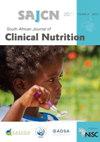南非夸祖鲁-纳塔尔补充喂养过渡期影响主要照顾者选择的因素
IF 0.8
Q4 NUTRITION & DIETETICS
引用次数: 0
摘要
背景:补充食品必须及时、足量、安全地制作,并且必须营养丰富。护理人员在确保补充喂养过渡及以后的过渡以最佳方式实现孩子的正常生长和发育方面发挥着至关重要的作用。目的:探讨在补充喂养过渡期,哪些因素影响主要照顾者的选择。方法:采用焦点小组讨论和访谈的方式,对参与最佳儿童生长发育(OrCHID)研究的儿童的照顾者进行横断面定性研究,其中包括来自环境中的母亲和儿童(MACE)队列和SONKE母亲和儿童队列的参与者。结果:在对焦点小组讨论和访谈的分析中,确定了九个主题,包括:(i)开始补充喂养;(ii)食物选择;(iii)家庭膳食;(iv)食品制备方法;(v) 膳食成分;(vi)质地;(vii)教育来源;(viii)食物来源;九营养知识。这些主题及其相关的关键概念被分类为时间和过渡、膳食准备、知识和选择。结论:照顾者在很大程度上依赖于家庭成员的建议,他们对自己的习俗和文化信仰体系提出了建议,这影响了照顾者何时开始补充食物、食物选择、质地、膳食组成以及向家庭膳食的过渡。护理人员根据可获得性、便利性和可负担性来采购辅食。照顾者描述了他们的喂养方式,他们的决定受到他们对孩子对所接受食物的情感和/或身体反应的敏感性的影响。关键词:焦点小组讨论、补充喂养实践、护理人员本文章由计算机程序翻译,如有差异,请以英文原文为准。
Factors affecting the choices made by primary caregivers during the complementary feeding transition period, KwaZulu-Natal, South Africa
Background: Complementary foods are required to be given timeously, in adequate amounts, prepared safely and must be nutritious. Caregivers play a vital role in ensuring that the complementary feeding transition and beyond happens optimally to achieve normal growth and development in their children. Objective: The aim was to explore what factors influenced the primary caregivers’ choices during the complementary feeding transition period. Methods: A cross-sectional qualitative study was conducted using focus-group discussions and interviews with caregivers of children enrolled in the Optimal Child Growth and Development (OrCHID) study, which included participants from the Mother and Child in Environment (MACE) cohort and SONKE mother and child cohort. Results: During the analysis of the focus-group discussions (FGDs) and interviews, nine themes were identified including: (i) starting complementary feeding; (ii) food choices; (iii) family meals; (iv) food preparation methods; (v) meal composition; (vi) texture; (vii) education source; (viii) food source; and (ix) nutrition knowledge. These themes and the key concepts associated with them were categorised into timing and transition, meal preparation, and knowledge and choices. Conclusion: The caregivers relied largely on advice from family members who advised on their customs and cultural belief systems, which then impacted when the caregivers started complementary foods, food choices, texture, meal composition and transition to family meals. The caregivers sourced complementary foods based on accessibility, convenience and affordability. The caregivers described having a responsive feeding style, where their decisions were influenced by their sensitivity to how their child was responding emotionally and/or physically to the foods they were receiving. Keywords: focus group discussion, complementary feeding practices, caregivers
求助全文
通过发布文献求助,成功后即可免费获取论文全文。
去求助
来源期刊

South African Journal of Clinical Nutrition
NUTRITION & DIETETICS-
CiteScore
2.50
自引率
9.10%
发文量
21
期刊介绍:
1.The Journal accepts articles from all basic and applied areas of dietetics and human nutrition, including clinical nutrition, community nutrition, food science, food policy, food service management, nutrition policy and public health nutrition. 2.The Journal has a broad interpretation of the field of nutrition and recognizes that there are many factors that determine nutritional status and that need to be the subject of scientific investigation and reported in the Journal. 3.The Journal seeks to serve a broad readership and to provide information that will be useful to the scientific community, the academic community, government and non-government stakeholders in the nutrition field, policy makers and industry.
 求助内容:
求助内容: 应助结果提醒方式:
应助结果提醒方式:


